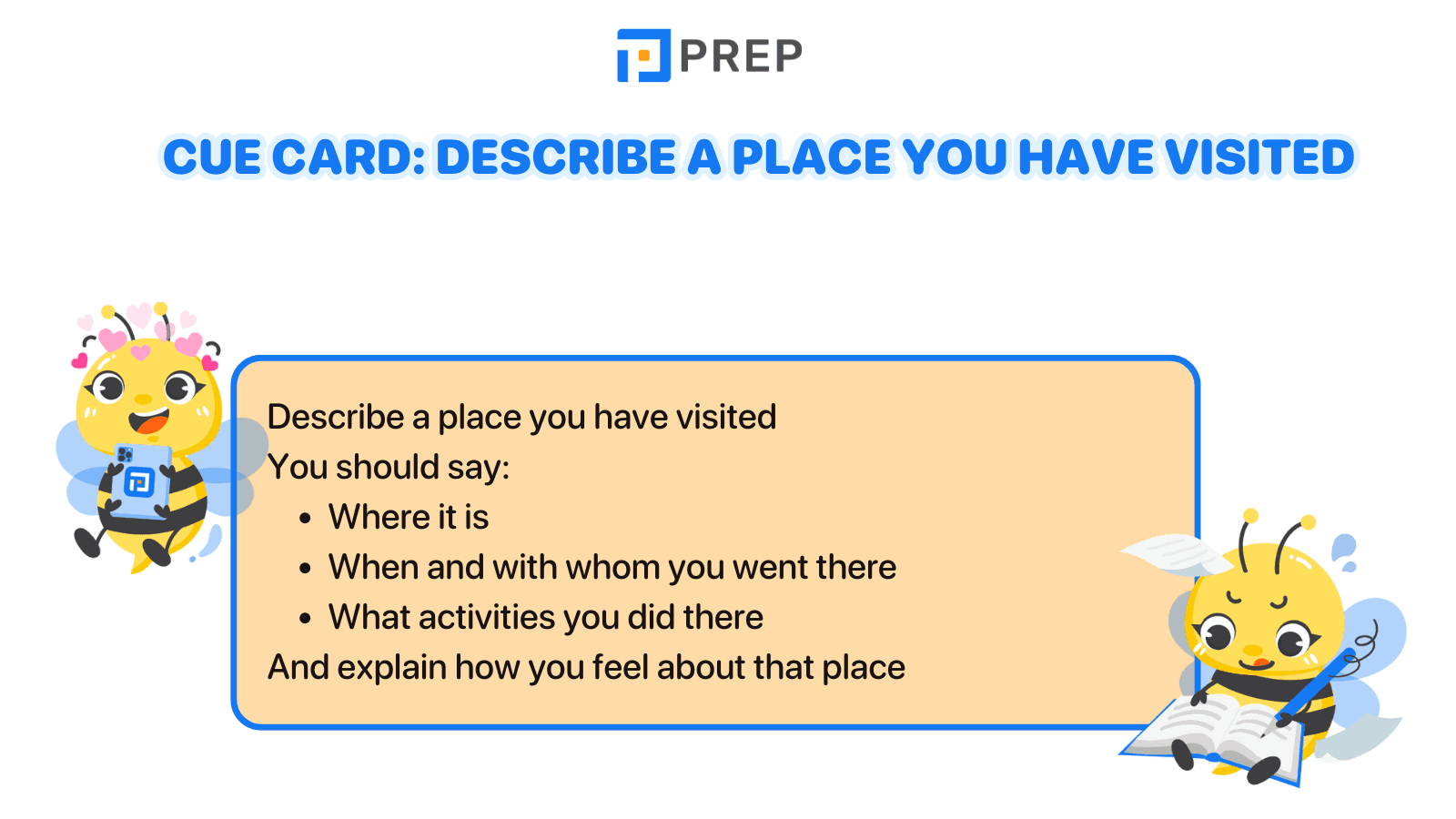Sample IELTS Speaking Part 2: Describe a place you have visited
"Describe a place you have visited" is a common topic in the IELTS Speaking Part 2. This type of question is similar to topics such as "Describe a beautiful place to visit in your country," "Describe a city you have visited," or "Describe a place you have visited on vacation." Therefore, the following article will provide you with an easy-to-reference sample, as well as useful phrases and expressions to apply during your self-study and exam preparation at home.

I. Cue card: Describe a place you have visited
Describe a place you have visited:

II. Part 2 Outline
1. Sample idea
- The topic "Describe a place you have visited" requires candidates to describe a place with beautiful scenery, providing specific information such as:
- Where is that place.
- Who you went there with and when.
- What you did there.
- Your overall impressions of the place.
- The topic "Describe a place you have visited" falls under the broader theme of "Traveling." To handle this topic effectively, it is best to closely follow the cues provided by the question and provide the most specific and detailed information possible, avoiding generalizations.
- For the first question, "Where is that place," simply choose a place with beautiful scenery. It doesn't necessarily have to be a place you have actually visited; it can be a place that has left an impression on you or a place you desire to visit. This also helps avoid repeating well-known places that Vietnamese candidates often use to describe, such as Da Nang, Hoi An, or Nha Trang, as it would make the answer dull and offer limited opportunities for exploration.
- For the second question, "Who you went there with and when," simply choose any specific time in the year (a particular season or period) or a special occasion (birthday, holiday) and think about the people you went with (family, friends, or even traveling alone).
- In response to the third question, "What you did there," think about common activities people usually do while traveling and consider adding typical and unique activities of the described place.
- The last question, "Your overall impressions of the place," is often considered the most crucial part of the speech. You can spend a significant portion of your speech expressing your feelings about the place or experiences you had there. However, with the "Describe a place you have visited" question format, you can also integrate your impressions into each part of the answer to the above questions, as long as you achieve the main goal of using vocabulary to describe emotions and perceptions about a particular place.

2. One-minute note taking
| Where it is | Hakone, Japan |
| When and with whom you went there | Went alone to Japan but was accompanied by a local friend |
| What activities you did there |
|
| How you feel about that place |
|
III. Sample Speaking: Describe a place you have visited

Please refer to the sample below for effective self-study of IELTS at home. Note that this is only a reference material, so please do not copy or memorize it for application in your actual exam.
I want to call myself a hodophile, a travel lover because whenever I have a chance, I’ll hit the road. I have been to many places, in Vietnam and other countries, and now I’d like to talk about the most recent place I’ve set foot in. That is Hakone, a lovely scenic town in Japan.
I went there last spring on a one-week solo trip to Japan. I was recommended this place by a local friend when I was browsing a travelling guide site. She was also the one who accompanied me to Hakone. To get to the city, I had to take a train from Tokyo’s Shinjuku Station and Hakone’s Yumoto Station via Odakyu Railway. Another alternative is to take the train using Japan Railways, but the fare is slightly higher.
Although I already knew about Hakone's charm, I was still stunned when I got there. From the windows of the train, I could already see the iconic Mount Fuji from afar, which was what I had longed to see. I then met my Japanese friend at Sounzan Station and took the first form of transport, the ropeway, to visit Hakone. Not only did I have a more close-up view of Mount Fuji from the cable car, I also caught a distinct view of the desolate mountainside covered by plumes of smoke in Owakudani. It was actually an active volcanic valley once called Hell Valley.
Then my friend insisted that I try the black eggs, another distinctive thing in Hakone. They are basically chicken eggs but boiled in Owakudani’s natural hot springs, whose water turns the eggshell as black as charcoal, and according to the local lore, eating one of these black eggs adds seven more years to our life. But to be very honest, it tasted like any regular hard-boiled egg to me.
Then, she introduced me to the onsen, which is basically bathing in hot springs but also what Hakone is most well-known for. I had to admit it was indeed a very heavenly experience.
In general, I was totally satisfied with the trip. The experience I had there still lingers until now even though it has already been a year.
Here is a list of the highlighted vocabulary used in the sample "Describe a place you have visited":
- Hodophile (n) - a lover of travel
- Hit the road (phrase) - to begin a journey
- Set foot in (phrase) - to visit or arrive at a place
- Scenic (adj) - having beautiful natural views
- Accompany (v) - to go together with someone
- A solo trip (phrase) - a journey taken alone
- Alternative (n) - a different option or choice
- Fare (n) - the price of a ticket for transportation
- Charm (n) - attractiveness or appeal
- Stunned (adj) - surprised or amazed
- Iconic (adj) - representing something as a symbol
- Ropeway (n) - a transportation system that uses cables or ropes
- Cable car (n) - a vehicle that transports people by cable
- Close-up (adj) - at a short distance or in detail
- Desolate (adj) - empty or deserted
- Plumes of smoke (phrase) - columns of smoke
- Charcoal (n) - a black carbonaceous substance used for drawing or as fuel
- Lore (n) - traditional knowledge or stories
- Active volcanic valley - a valley with an active volcano
- To be (very) honest (phrase) - to be truthful
- Hard-boiled egg - an egg cooked until the yolk and white are solid
- Must-try (adj) - something that is highly recommended to experience
- Picturesque (adj) - visually attractive, like a picture
- Heavenly (adj) - extremely beautiful or enjoyable
- Linger (v) - to stay or remain in a place for a longer time
Read more:
- Sample IELTS Speaking Part 2, 3: Describe a song you like
- Sample Speaking Part 2: Describe a time when someone apologized to you
- Sample IELTS Speaking Part 1, 2, 3: Describe your mother
IV. Boost Your Confidence With Expert-Led Training
This article has provided the most detailed sample for IELTS Speaking Part 2 topic "Describe a place you have visited," written by IELTS mentor at PREP. If you want expert feedback on your progress, explore our personalized IELTS course below:
👉IELTS training: Master IELTS With Us!

Hi I'm Chloe, and I am currently serving as an Product Content Administrator at Prep Education. With over five years of experience in independent online IELTS study and exam preparation, I am confident in my ability to support learners in achieving their highest possible scores.
Comment
Premium content
View allPersonalized roadmap
Most read












